Catholic Social Thought: Principles, Self, and Community Analysis
VerifiedAdded on 2022/09/16
|6
|1360
|25
Report
AI Summary
This report provides an analysis of the principles of Catholic Social Thought (CST), focusing on human dignity, common good, and preferential option for the poor. The report examines the core tenets of CST, including the inherent value of each individual, the importance of community well-being, and the prioritization of the needs of the vulnerable. It explores the relationship between the self and the community, emphasizing how individual actions and awareness contribute to the common good. The report references key CST principles, highlighting the interconnectedness of the self and the community. Furthermore, the report emphasizes the importance of respecting human dignity, promoting the common good, and giving preferential consideration to the needs of the poor and vulnerable. The author uses Ubuntu as an example of the relationship between self and community.
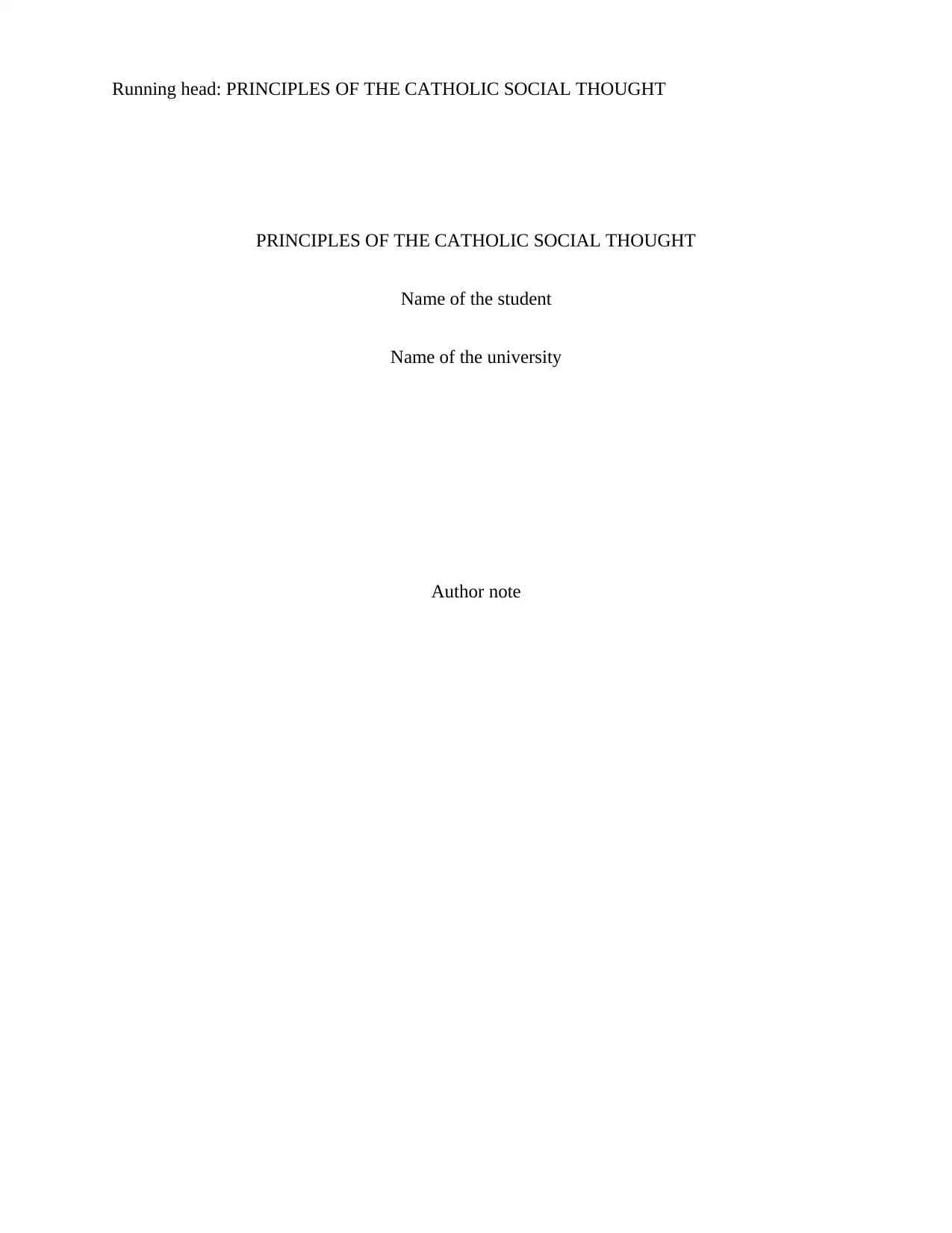
Running head: PRINCIPLES OF THE CATHOLIC SOCIAL THOUGHT
PRINCIPLES OF THE CATHOLIC SOCIAL THOUGHT
Name of the student
Name of the university
Author note
PRINCIPLES OF THE CATHOLIC SOCIAL THOUGHT
Name of the student
Name of the university
Author note
Paraphrase This Document
Need a fresh take? Get an instant paraphrase of this document with our AI Paraphraser
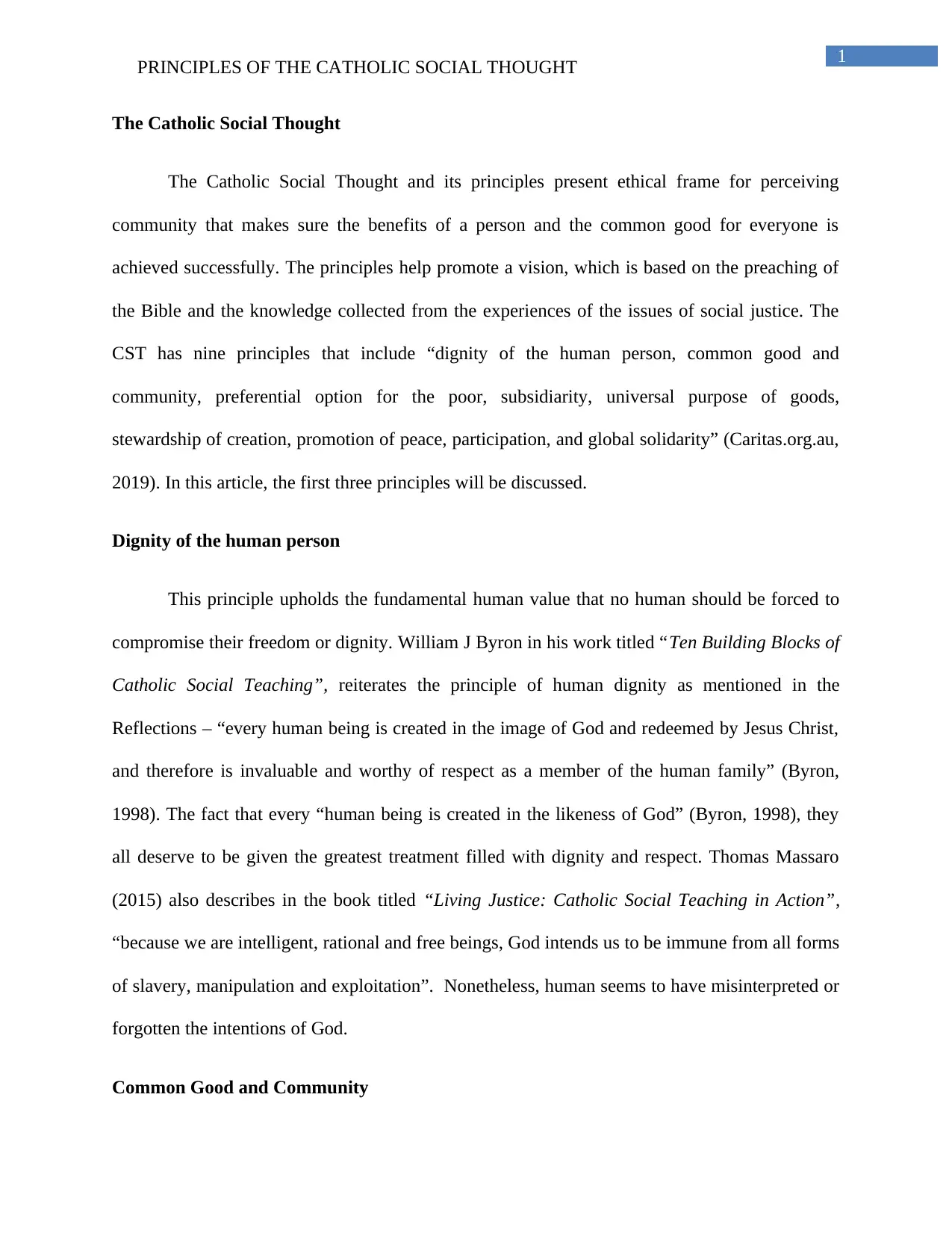
1
PRINCIPLES OF THE CATHOLIC SOCIAL THOUGHT
The Catholic Social Thought
The Catholic Social Thought and its principles present ethical frame for perceiving
community that makes sure the benefits of a person and the common good for everyone is
achieved successfully. The principles help promote a vision, which is based on the preaching of
the Bible and the knowledge collected from the experiences of the issues of social justice. The
CST has nine principles that include “dignity of the human person, common good and
community, preferential option for the poor, subsidiarity, universal purpose of goods,
stewardship of creation, promotion of peace, participation, and global solidarity” (Caritas.org.au,
2019). In this article, the first three principles will be discussed.
Dignity of the human person
This principle upholds the fundamental human value that no human should be forced to
compromise their freedom or dignity. William J Byron in his work titled “Ten Building Blocks of
Catholic Social Teaching”, reiterates the principle of human dignity as mentioned in the
Reflections – “every human being is created in the image of God and redeemed by Jesus Christ,
and therefore is invaluable and worthy of respect as a member of the human family” (Byron,
1998). The fact that every “human being is created in the likeness of God” (Byron, 1998), they
all deserve to be given the greatest treatment filled with dignity and respect. Thomas Massaro
(2015) also describes in the book titled “Living Justice: Catholic Social Teaching in Action”,
“because we are intelligent, rational and free beings, God intends us to be immune from all forms
of slavery, manipulation and exploitation”. Nonetheless, human seems to have misinterpreted or
forgotten the intentions of God.
Common Good and Community
PRINCIPLES OF THE CATHOLIC SOCIAL THOUGHT
The Catholic Social Thought
The Catholic Social Thought and its principles present ethical frame for perceiving
community that makes sure the benefits of a person and the common good for everyone is
achieved successfully. The principles help promote a vision, which is based on the preaching of
the Bible and the knowledge collected from the experiences of the issues of social justice. The
CST has nine principles that include “dignity of the human person, common good and
community, preferential option for the poor, subsidiarity, universal purpose of goods,
stewardship of creation, promotion of peace, participation, and global solidarity” (Caritas.org.au,
2019). In this article, the first three principles will be discussed.
Dignity of the human person
This principle upholds the fundamental human value that no human should be forced to
compromise their freedom or dignity. William J Byron in his work titled “Ten Building Blocks of
Catholic Social Teaching”, reiterates the principle of human dignity as mentioned in the
Reflections – “every human being is created in the image of God and redeemed by Jesus Christ,
and therefore is invaluable and worthy of respect as a member of the human family” (Byron,
1998). The fact that every “human being is created in the likeness of God” (Byron, 1998), they
all deserve to be given the greatest treatment filled with dignity and respect. Thomas Massaro
(2015) also describes in the book titled “Living Justice: Catholic Social Teaching in Action”,
“because we are intelligent, rational and free beings, God intends us to be immune from all forms
of slavery, manipulation and exploitation”. Nonetheless, human seems to have misinterpreted or
forgotten the intentions of God.
Common Good and Community
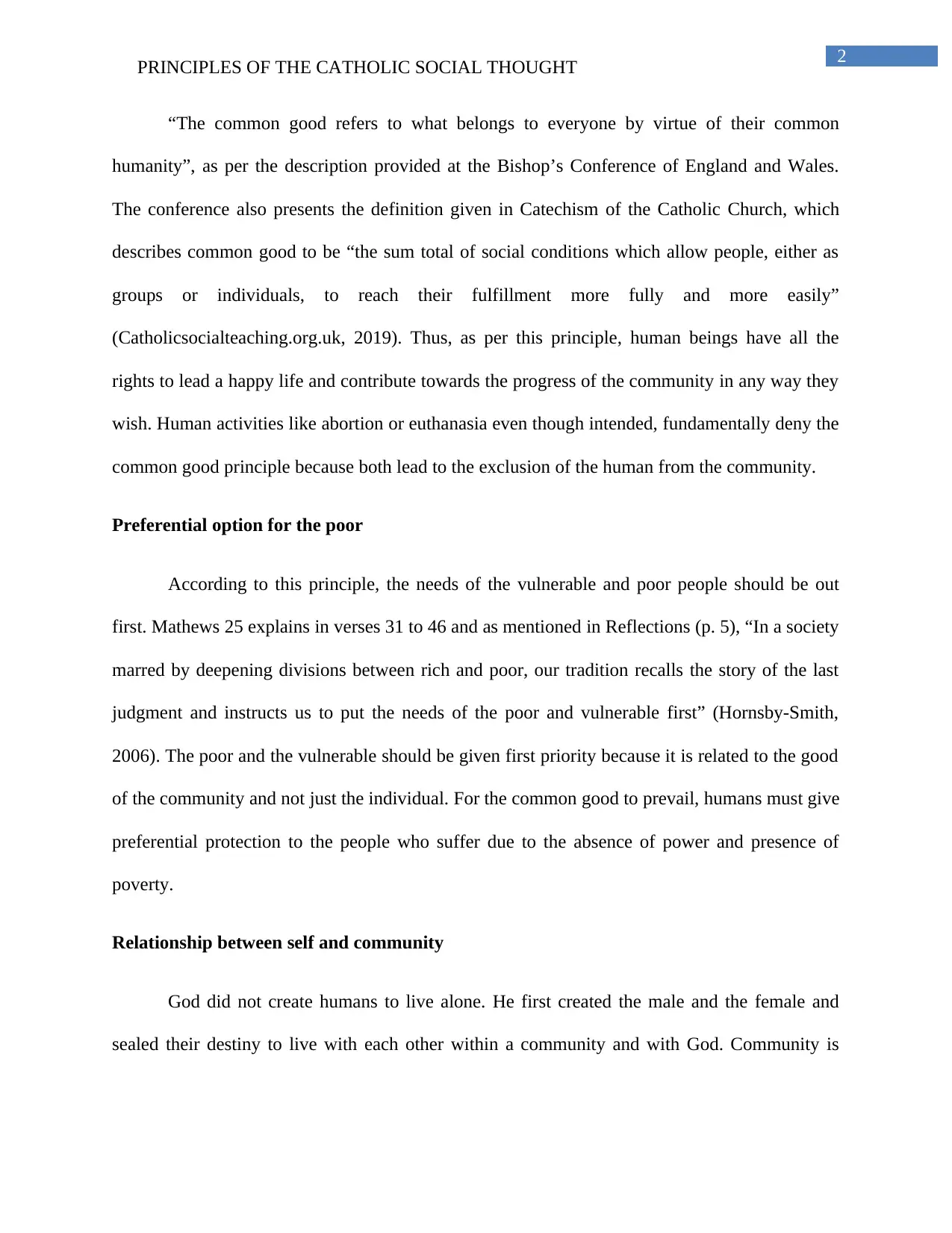
2
PRINCIPLES OF THE CATHOLIC SOCIAL THOUGHT
“The common good refers to what belongs to everyone by virtue of their common
humanity”, as per the description provided at the Bishop’s Conference of England and Wales.
The conference also presents the definition given in Catechism of the Catholic Church, which
describes common good to be “the sum total of social conditions which allow people, either as
groups or individuals, to reach their fulfillment more fully and more easily”
(Catholicsocialteaching.org.uk, 2019). Thus, as per this principle, human beings have all the
rights to lead a happy life and contribute towards the progress of the community in any way they
wish. Human activities like abortion or euthanasia even though intended, fundamentally deny the
common good principle because both lead to the exclusion of the human from the community.
Preferential option for the poor
According to this principle, the needs of the vulnerable and poor people should be out
first. Mathews 25 explains in verses 31 to 46 and as mentioned in Reflections (p. 5), “In a society
marred by deepening divisions between rich and poor, our tradition recalls the story of the last
judgment and instructs us to put the needs of the poor and vulnerable first” (Hornsby-Smith,
2006). The poor and the vulnerable should be given first priority because it is related to the good
of the community and not just the individual. For the common good to prevail, humans must give
preferential protection to the people who suffer due to the absence of power and presence of
poverty.
Relationship between self and community
God did not create humans to live alone. He first created the male and the female and
sealed their destiny to live with each other within a community and with God. Community is
PRINCIPLES OF THE CATHOLIC SOCIAL THOUGHT
“The common good refers to what belongs to everyone by virtue of their common
humanity”, as per the description provided at the Bishop’s Conference of England and Wales.
The conference also presents the definition given in Catechism of the Catholic Church, which
describes common good to be “the sum total of social conditions which allow people, either as
groups or individuals, to reach their fulfillment more fully and more easily”
(Catholicsocialteaching.org.uk, 2019). Thus, as per this principle, human beings have all the
rights to lead a happy life and contribute towards the progress of the community in any way they
wish. Human activities like abortion or euthanasia even though intended, fundamentally deny the
common good principle because both lead to the exclusion of the human from the community.
Preferential option for the poor
According to this principle, the needs of the vulnerable and poor people should be out
first. Mathews 25 explains in verses 31 to 46 and as mentioned in Reflections (p. 5), “In a society
marred by deepening divisions between rich and poor, our tradition recalls the story of the last
judgment and instructs us to put the needs of the poor and vulnerable first” (Hornsby-Smith,
2006). The poor and the vulnerable should be given first priority because it is related to the good
of the community and not just the individual. For the common good to prevail, humans must give
preferential protection to the people who suffer due to the absence of power and presence of
poverty.
Relationship between self and community
God did not create humans to live alone. He first created the male and the female and
sealed their destiny to live with each other within a community and with God. Community is
⊘ This is a preview!⊘
Do you want full access?
Subscribe today to unlock all pages.

Trusted by 1+ million students worldwide
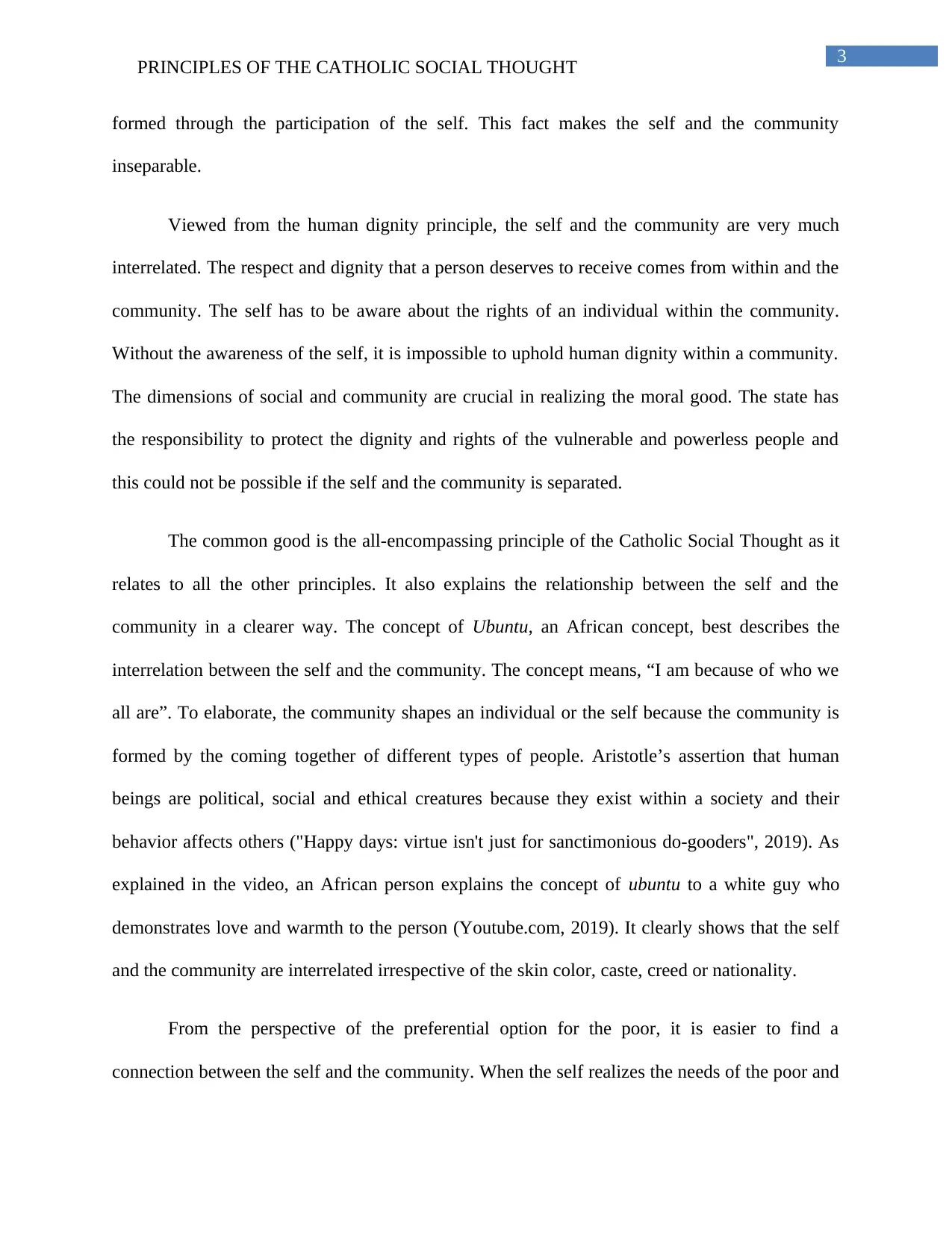
3
PRINCIPLES OF THE CATHOLIC SOCIAL THOUGHT
formed through the participation of the self. This fact makes the self and the community
inseparable.
Viewed from the human dignity principle, the self and the community are very much
interrelated. The respect and dignity that a person deserves to receive comes from within and the
community. The self has to be aware about the rights of an individual within the community.
Without the awareness of the self, it is impossible to uphold human dignity within a community.
The dimensions of social and community are crucial in realizing the moral good. The state has
the responsibility to protect the dignity and rights of the vulnerable and powerless people and
this could not be possible if the self and the community is separated.
The common good is the all-encompassing principle of the Catholic Social Thought as it
relates to all the other principles. It also explains the relationship between the self and the
community in a clearer way. The concept of Ubuntu, an African concept, best describes the
interrelation between the self and the community. The concept means, “I am because of who we
all are”. To elaborate, the community shapes an individual or the self because the community is
formed by the coming together of different types of people. Aristotle’s assertion that human
beings are political, social and ethical creatures because they exist within a society and their
behavior affects others ("Happy days: virtue isn't just for sanctimonious do-gooders", 2019). As
explained in the video, an African person explains the concept of ubuntu to a white guy who
demonstrates love and warmth to the person (Youtube.com, 2019). It clearly shows that the self
and the community are interrelated irrespective of the skin color, caste, creed or nationality.
From the perspective of the preferential option for the poor, it is easier to find a
connection between the self and the community. When the self realizes the needs of the poor and
PRINCIPLES OF THE CATHOLIC SOCIAL THOUGHT
formed through the participation of the self. This fact makes the self and the community
inseparable.
Viewed from the human dignity principle, the self and the community are very much
interrelated. The respect and dignity that a person deserves to receive comes from within and the
community. The self has to be aware about the rights of an individual within the community.
Without the awareness of the self, it is impossible to uphold human dignity within a community.
The dimensions of social and community are crucial in realizing the moral good. The state has
the responsibility to protect the dignity and rights of the vulnerable and powerless people and
this could not be possible if the self and the community is separated.
The common good is the all-encompassing principle of the Catholic Social Thought as it
relates to all the other principles. It also explains the relationship between the self and the
community in a clearer way. The concept of Ubuntu, an African concept, best describes the
interrelation between the self and the community. The concept means, “I am because of who we
all are”. To elaborate, the community shapes an individual or the self because the community is
formed by the coming together of different types of people. Aristotle’s assertion that human
beings are political, social and ethical creatures because they exist within a society and their
behavior affects others ("Happy days: virtue isn't just for sanctimonious do-gooders", 2019). As
explained in the video, an African person explains the concept of ubuntu to a white guy who
demonstrates love and warmth to the person (Youtube.com, 2019). It clearly shows that the self
and the community are interrelated irrespective of the skin color, caste, creed or nationality.
From the perspective of the preferential option for the poor, it is easier to find a
connection between the self and the community. When the self realizes the needs of the poor and
Paraphrase This Document
Need a fresh take? Get an instant paraphrase of this document with our AI Paraphraser
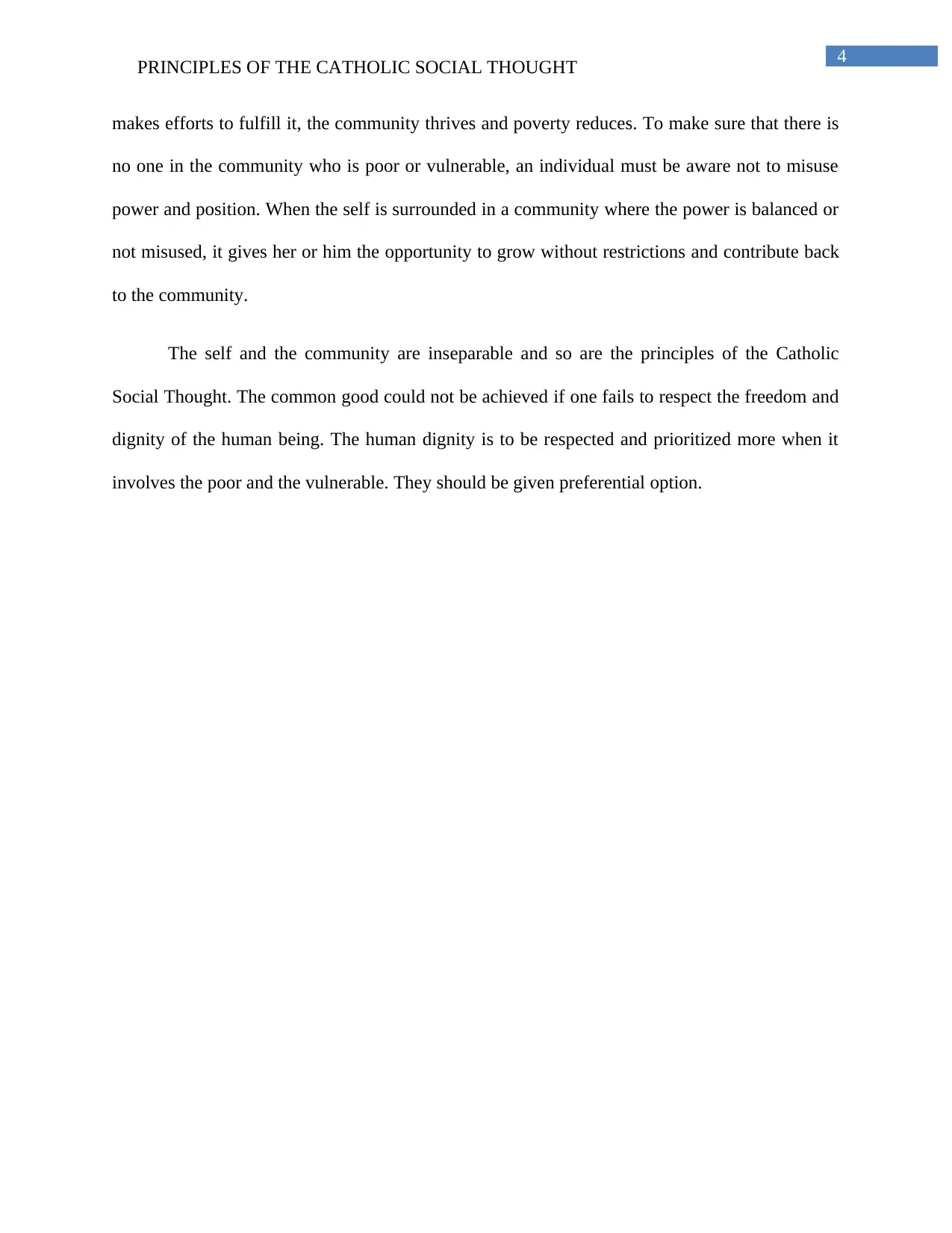
4
PRINCIPLES OF THE CATHOLIC SOCIAL THOUGHT
makes efforts to fulfill it, the community thrives and poverty reduces. To make sure that there is
no one in the community who is poor or vulnerable, an individual must be aware not to misuse
power and position. When the self is surrounded in a community where the power is balanced or
not misused, it gives her or him the opportunity to grow without restrictions and contribute back
to the community.
The self and the community are inseparable and so are the principles of the Catholic
Social Thought. The common good could not be achieved if one fails to respect the freedom and
dignity of the human being. The human dignity is to be respected and prioritized more when it
involves the poor and the vulnerable. They should be given preferential option.
PRINCIPLES OF THE CATHOLIC SOCIAL THOUGHT
makes efforts to fulfill it, the community thrives and poverty reduces. To make sure that there is
no one in the community who is poor or vulnerable, an individual must be aware not to misuse
power and position. When the self is surrounded in a community where the power is balanced or
not misused, it gives her or him the opportunity to grow without restrictions and contribute back
to the community.
The self and the community are inseparable and so are the principles of the Catholic
Social Thought. The common good could not be achieved if one fails to respect the freedom and
dignity of the human being. The human dignity is to be respected and prioritized more when it
involves the poor and the vulnerable. They should be given preferential option.
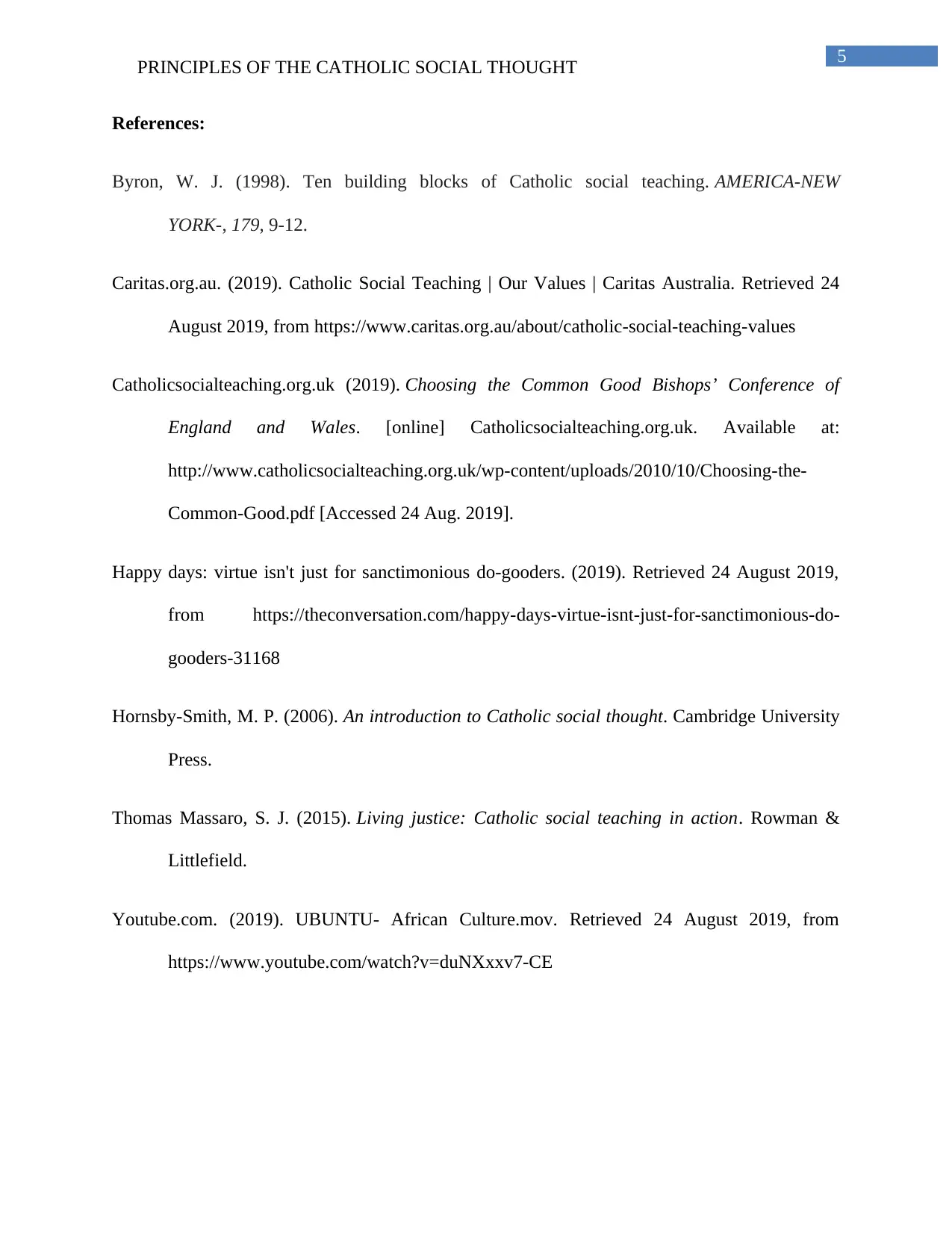
5
PRINCIPLES OF THE CATHOLIC SOCIAL THOUGHT
References:
Byron, W. J. (1998). Ten building blocks of Catholic social teaching. AMERICA-NEW
YORK-, 179, 9-12.
Caritas.org.au. (2019). Catholic Social Teaching | Our Values | Caritas Australia. Retrieved 24
August 2019, from https://www.caritas.org.au/about/catholic-social-teaching-values
Catholicsocialteaching.org.uk (2019). Choosing the Common Good Bishops’ Conference of
England and Wales. [online] Catholicsocialteaching.org.uk. Available at:
http://www.catholicsocialteaching.org.uk/wp-content/uploads/2010/10/Choosing-the-
Common-Good.pdf [Accessed 24 Aug. 2019].
Happy days: virtue isn't just for sanctimonious do-gooders. (2019). Retrieved 24 August 2019,
from https://theconversation.com/happy-days-virtue-isnt-just-for-sanctimonious-do-
gooders-31168
Hornsby-Smith, M. P. (2006). An introduction to Catholic social thought. Cambridge University
Press.
Thomas Massaro, S. J. (2015). Living justice: Catholic social teaching in action. Rowman &
Littlefield.
Youtube.com. (2019). UBUNTU- African Culture.mov. Retrieved 24 August 2019, from
https://www.youtube.com/watch?v=duNXxxv7-CE
PRINCIPLES OF THE CATHOLIC SOCIAL THOUGHT
References:
Byron, W. J. (1998). Ten building blocks of Catholic social teaching. AMERICA-NEW
YORK-, 179, 9-12.
Caritas.org.au. (2019). Catholic Social Teaching | Our Values | Caritas Australia. Retrieved 24
August 2019, from https://www.caritas.org.au/about/catholic-social-teaching-values
Catholicsocialteaching.org.uk (2019). Choosing the Common Good Bishops’ Conference of
England and Wales. [online] Catholicsocialteaching.org.uk. Available at:
http://www.catholicsocialteaching.org.uk/wp-content/uploads/2010/10/Choosing-the-
Common-Good.pdf [Accessed 24 Aug. 2019].
Happy days: virtue isn't just for sanctimonious do-gooders. (2019). Retrieved 24 August 2019,
from https://theconversation.com/happy-days-virtue-isnt-just-for-sanctimonious-do-
gooders-31168
Hornsby-Smith, M. P. (2006). An introduction to Catholic social thought. Cambridge University
Press.
Thomas Massaro, S. J. (2015). Living justice: Catholic social teaching in action. Rowman &
Littlefield.
Youtube.com. (2019). UBUNTU- African Culture.mov. Retrieved 24 August 2019, from
https://www.youtube.com/watch?v=duNXxxv7-CE
⊘ This is a preview!⊘
Do you want full access?
Subscribe today to unlock all pages.

Trusted by 1+ million students worldwide
1 out of 6
Related Documents
Your All-in-One AI-Powered Toolkit for Academic Success.
+13062052269
info@desklib.com
Available 24*7 on WhatsApp / Email
![[object Object]](/_next/static/media/star-bottom.7253800d.svg)
Unlock your academic potential
Copyright © 2020–2025 A2Z Services. All Rights Reserved. Developed and managed by ZUCOL.





